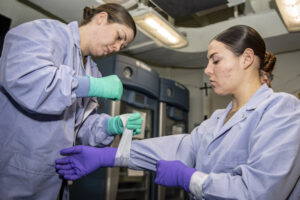
Story by Michael Wilson
Naval Medical Research Command
SAN DIEGO – Personnel with Naval Medical Research Command (NMRC) provided training on biological attack response and mitigation to Sailors aboard the amphibious assault ship USS Boxer (LHD 4) from January 24-25.
The training provides shipboard medical laboratory technicians with biological warfare confirmatory detection expertise to enhance a ship’s ability to safely manage samples from suspected biological attacks and provide accurate, expedited results to best preserve the health and readiness of personnel at-sea.
“This training enhances our laboratory technicians’ ability to utilize equipment on board to expeditiously and safely identify potential biological and chemical weapons that may be directed at our ship,” explained Lt. Cmdr. Paul Flood, senior medical officer for the Boxer. “Expeditious identification helps the damage control team posture the ship in the best CBRNE defense and allows the medical team to provide life -saving treatments. Any significant delay can have lasting impacts on sailors and marines on board.”
“I hope that the team never has to utilize the training that is being conducted,” Flood added, “but I know that the team that we have on board is more than capable of answering the call should the need arise.”
Shipboard medical personnel undergo a range of drills and exercises, to include mass casualty response, chemical, biological, radiological, and nuclear defense (CBRNE) and medical evacuation. Boxer’s medical department, and those on other ships that receive annual biological warfare training from NMRC’s Biological Disease Research Directorate (BDRD), are taught Next Generation Diagnostic System (NGDS) proficiency testing. The NGDS system is used to test for unknown biological warfare agents while ships are operating out at sea or foreign ports.
“When we visit the ship, our objective is to make sure that NGDS system has a current software system, and that the ship has received unexpired reagent and supplies,” explained Chief Hospital Corpsman Shiva Giri, one of the NMRC instructors. “We also refresh laboratory technicians’ proficiency testing skills and make sure that their biological warfare agent testing capacity is running well while away from home port.”
The BDRD team, located at Ft. Detrick, works to advance research and development of therapeutics to protect against biological attacks. BDRD trainers perform five to seven visits to ships every year to provide testing and training.
NMRC is engaged in a broad spectrum of activity from basic science in the laboratory to field studies in austere and remote areas of the world to investigations in operational environments. In support of the Navy, Marine Corps, and joint U.S. warfighters, researchers study infectious diseases, biological warfare detection and defense, combat casualty care, environmental health concerns, aerospace and undersea medicine, medical modeling, simulation, operational mission support, epidemiology and behavioral sciences.